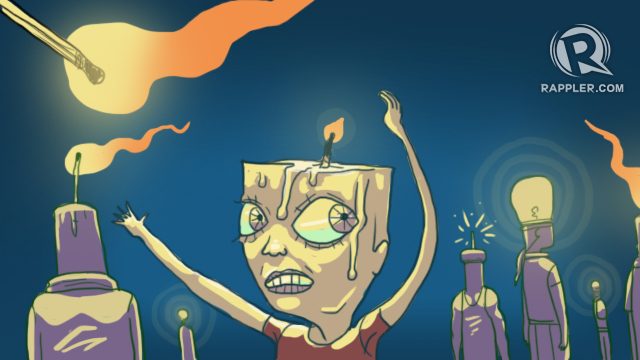SUMMARY
This is AI generated summarization, which may have errors. For context, always refer to the full article.

As I write this, I am in Sonya’s Garden and was handed a flower by a young man named Joel who was serving me breakfast. It was a passion flower with a breathtaking “architecture” that looked like it really made great use of its time unfolding. First of its inside, with 5 stamens in formation like a quintet connected to its next layer – 3 gramophone-shaped pistil stigmas. Then, behold the “ring” of vertical purple-and-white slivers that seem to shield the inner “musical formation.” Finally, the bloodied blend of 10 petals reaching out as if to announce, “am ready.” I complemented Joel for his thoughtfulness and he told me beaming, albeit unasked, that he is already in fourth year college. It was my turn to beam him a smile back. This is why.
A study has been published this year saying that after looking at groups belonging to different eras (1925 and 1945) and comparing the disparities with more recent years, they have confirmed even more strongly now that education is associated with longer lives and that conversely, no or low education is linked to shorter lives. The big thing about the report is that they have found this association to be true over and over again so that they can now say that a significant part of the relationship between level of education and length of life is causal – which means no or low education could cause early deaths.
How could no or low education make you likely to die early? Studies have pointed to five general roads that lead to this. First, if you do not get an education or did not finish high school or college, you are less likely to reach a higher level of income and social status. Having less income limits your health options, whether preventive or curative.
Second, a severely limited education is more likely to compromise the development of your own brain. Education expands and makes new connections in your brain. Knowing more puts you in a state where you are likely to understand more and therefore, poises you to shape a purpose to your life and studies back it up that purpose is good for your brain and what is good for your brain is good for your life.
Third, if you did not get enough education, you are less willing or less able to understand the importance or crucial role of medical treatments in illnesses that could come your way. Having an education makes you understand your illness better and makes you more willing to follow good medical advice and procedures.
Fourth, if you do not get an education, you are less likely to adapt behaviors in favor of your health, not being aware of running knowledge that relates lifestyle and health, regardless of age. Being educated exposes you in a sustained way, to the benefits of a healthy behavior and the hazards of the opposite.
Lastly, not finishing your education could limit your social circle and your reach to understand the wider family of humans in terms of commonalities and differences. It means you get to widen your social circles and since we are fundamentally wired to be social, then it feeds on to our well-being.
The researchers of the study even stated that the deaths that could be blamed on low education is comparable to deaths that could be attributed if you still smoked now as opposed to being a former smoker.
The study glaringly points to what has to be done in terms of policies addressing populations who have serious problems finishing their education. If individuals and government think that signing off on education only makes one sign off on books, then this study proves that they are gravely mistaken. Not having an education or not finishing college could more likely mean signing off from life earlier than those who were able to complete their education. This is another strong reason to support education for everyone, especially for those who want it but cannot afford it.
Joel will get his college degree next year because his work at Sonya’s enabled him to do so. He interacts with guests with such sincerity and willingness to elevate the quality of their day. He can answer any question I have about the garden and their services. He is in fact saying, like the passion flower he handed me, “am ready for life.” – Rappler.com
Add a comment
How does this make you feel?
There are no comments yet. Add your comment to start the conversation.